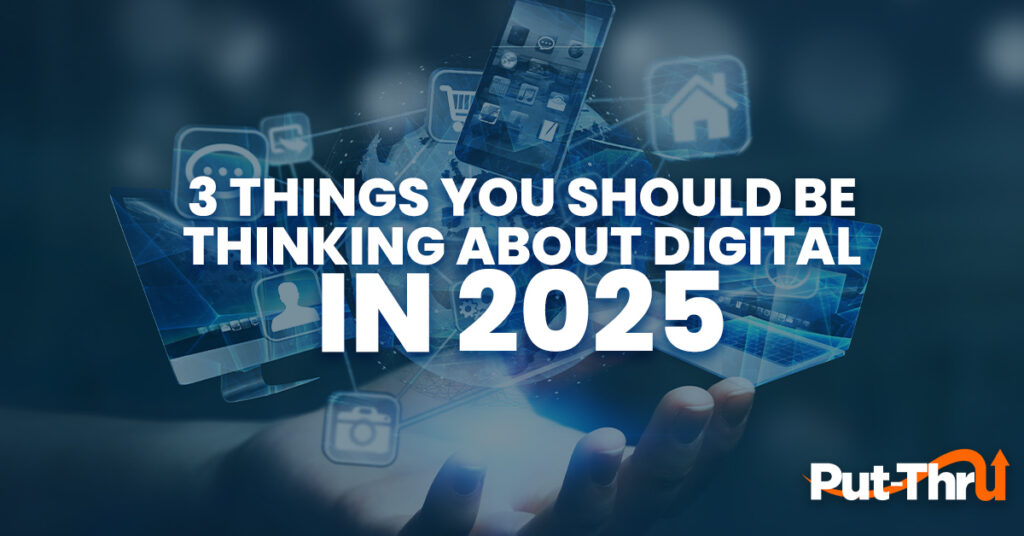3 Things You should be thinking about digital in 2025

To say things move quickly in digital marketing is a gross understatement. In just a few years, our industry hasn’t just shifted, it has completely transformed. So much so that our roles, as marketers, have completely changed. Did you notice? Everything has been redefined strictly to adhere to what benefits Big Tech and only Big Tech.
1. If it feels like the world has gone mad, it’s because it has. If it doesn’t feel like its gone mad, candidly it’s because you’re not paying attention.
Collectively, we’ve witnessed and experienced the most foolish and fastest shift in how platforms operate in the history of digital marketing. We went from assessing lead quality to assessing if the lead is a human being. And nobody blinked. We just all came into to work and went, “Sure, this makes sense. There isn’t a problem here…”. Have we lost it?
What we consider “good data” today has completely changed from even just a few years ago. You know, when we actuallymonitored things like accuracy and quality. Now we just hope that the platform gods grant us a tenable cpm and a high enough ratio of actual humans-to-bots to show any results at all. CPM used to be a metric we defined. Now it’s just a gift or a curse granted to us by the platform casino after we spin the wheel and chant “Big bucks, no whammies!”. A dated reference before my time but I like it. (Google it, you will thank me later)
We go to conferences and talk about how to drive higher CTRs and completely ignore the reality that the mechanical traffic is clicking and crawling everything we serve. We ignore the hugh bounce rates occurring in literal milliseconds that perfectly informs us it’s bot traffic.
We talk about branding like it’s 2008, and that it makes perfect sense to brand your high-end roofing company into audiences that don’t even own their own homes and don’t have income that makes you believe they will anytime soon. We act like that is somehow a rational way to spend marketing dollars.
2. Can someone come get Meta, they’re drunk
Meta: We have hundreds of thousands of targeting selects in our ad manager to help you discover your perfect audience.
Also Meta: If there are 200k people that meet your most basic criteria for audiences likely to buy, then your actual audience size needs to be at least 2 million people.
Huh? Did they just tell us that they spent a decade building the most data enriched platform for marketing so that we can broaden our audience and completely ignore the most fundamental needs of our marketing? Yeah, they did. Let’s use an example: If you sell high-end windows in Sarasota, FL, you need an audience whose homes are worth more than the median, but lets forget demographics for the moment. Meta says your audience size should be at least 2 million people to drive conversions. There are roughly 60,000 people in Sarasota. As my good friend, Jeff Shirley likes to say, “that math ain’t math’n!!!” Before you lecture me about scale and AI, just know that the bulk of Meta’s revenue comes small investment campaigns. The bulk. So it begs the question, is Meta drunk or do they really think we’re that uneducated?
3. Adtech Platforms are the New Google for Marketers
I mean that in as snarky a way as your mind can possibly imagine. As Google started to boom, they knew that if marketers could ever truly master their platform, their revenue opportunity would diminish. So they built an entire team of people whose sole job is to consistently adjust their algorithm, preventing us (collectively) from ever really knowing what the best practice is day-to-day. They knew they needed to deliver just enough of a result in order to support a multi-billion dollar industry that monetizes solely with their platform.
Social media and adtech platforms are doing EXACTLY the same thing. It’s a never ending game of three-card monte where you never really catch the sleight of hand. Never. And just when we think we’re close, they change the rules of the game completely.
If you think there must be a better way, you’re 100% correct. This is the part where a blogger pitches their play but that’s not the point here. The point here is to let you know that you are not alone. You are NOT the only one that looks at what we’re doing and thinks it’s nuts. And you’re certainly not alone if you’re skeptical of BigTech’s agenda. They don’t give a shit about your campaign performance. They care about power, influence, shareholders and liquidity. It’s the nature of the beast, but that doesn’t mean we have to just get in line and trust them, either.
Think of this as a support group for recovering experts. We know what we know, and we know they don’t know what they say they know. You know?
